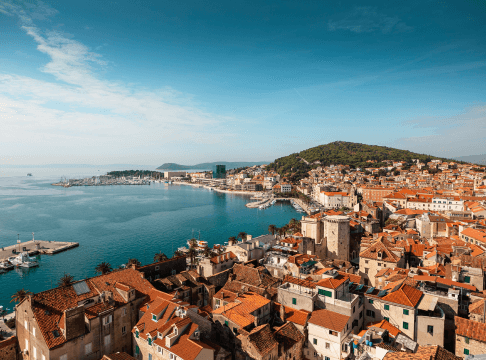- +91 74090 30325
- contact@eduquest-global.com
Croatia, a captivating country at the crossroads of Central Europe and the Mediterranean, offers a treasure trove of experiences for international students. Beyond its stunning Adriatic coastline and rich cultural heritage lies a well-respected education system attracting students worldwide. This comprehensive guide provides all the details you need to embark on your unique study abroad journey in Croatia.

Croatia boasts a rich tapestry of history, culture, and breathtaking natural beauty. Explore ancient Roman ruins, charming medieval towns, and stunning Adriatic coastlines. Immerse yourself in the vibrant local culture, with delicious food, lively festivals, and a relaxed Mediterranean lifestyle.
Croatia’s higher education system comprises:
Universities are public institutions offering a broad range of academic programs leading to bachelor’s, master’s, and doctoral degrees.
Polytechnics: public institutions providing vocational and professional programs with a strong focus on practical skills
Colleges of Applied Sciences: Both public and private institutions offer shorter professional programs focused on specific careers.
The application process can vary slightly depending on the institution, but some general requirements include:
croatia offers a diverse range of study programs, including:
Croatia's growing economy provides ample career opportunities with degrees in business administration, finance, and entrepreneurship
Given Croatia's dependence on tourism, programs in this field equip students with the skills to excel in hotels, resorts, and travel agencies.
Engineering programs in Croatia cover various specializations, including civil engineering, mechanical engineering, and electrical engineering.
Life Sciences are a vital area of study, playing a crucial role in advancing healthcare, agriculture, and environmental sustainability through innovative research and technological development.
Marine Sciences are essential for understanding and protecting our oceans, contributing to sustainable management of marine resources and addressing global challenges like climate change and biodiversity loss
History is a fundamental discipline that explores the past, providing insights into cultural, social, and political developments that shape our current world and inform future decisions.
Archaeology delves into human history through the excavation and analysis of artifacts and sites, offering invaluable insights into ancient civilizations and their impacts on modern society.
Explore programs offered by different institutions and select the one that aligns with your academic goals and interests.
Carefully review the specific requirements for your chosen program.
Gather all necessary documents, ensuring they are translated and legalized if required
Apply directly through the chosen institution's online portal or application system.
Secure a student visa after receiving your acceptance letter
State Matura Exams
Standardized English Test
Cost of Living in Croatia
The cost of living in Croatia is generally lower than in Western Europe. Here’s a breakdown of estimated monthly expenses
for a comprehensive list of universities, colleges, and schools in Croatia, you can refer to the official website of the Ministry of Science and Education or explore resources like Study in Croatia.
Information regarding student visas can be found on the website of the Croatian Ministry of Foreign and European Affairs. Visa requirements and procedures can vary depending on your nationality, so it's crucial to check the latest updates.
International students with a valid student visa might be eligible for part-time work permits, allowing them to work up to 20 hours per week during the semester and full-time during breaks.
Graduates with a Croatian degree may be eligible for a temporary work permit to seek employment in their field. The EU Blue Card is another option for highly qualified graduates.
The EU Blue Card is a residence and work permit scheme designed to attract highly skilled non-EU nationals to work and live in Croatia (and other European Union countries)
Apply through the Croatian Ministry of Labour and Pension System. The process typically involves submitting documents like your diploma, a job offer, proof of qualifications, and a valid passport.
Explore master's programs offered by Croatian universities and identify the one that aligns with your academic background and career goals.
Carefully examine the specific requirements for your chosen Master's program. These may include transcripts, letters of recommendation, research proposals (for some programs), and a higher level of English language proficiency compared to undergraduate programs.
Gather all necessary documents, ensuring they are translated and legalized if required.
Apply directly through the chosen university's online portal or application system. Deadlines can vary, so ensure you submit your application well in advance.
Some universities might require an interview as part of the application process.
Prove your English skills
For English-taught programs, you’ll need to demonstrate your English language proficiency through internationally recognized tests like:
Application Deadlines for Croatia
Application deadlines can vary significantly between institutions and programs. In general:
Applications typically open in February or March and close in May or June.
Deadlines are usually in September or October for applications submitted by December or January.
Embarking on an international education adventure in Croatia is an exciting decision. But navigating the application process, visas, and unfamiliar territory can feel overwhelming. That’s where EduQuest Global steps in as your trusted partner on your Croatian study journey. Here’s why you should choose EduQuest Global:
Our experienced counselors are deeply familiar with the Maltese higher education system, including universities, programs, and admission requirements. We stay current on the latest developments to ensure you make informed decisions.
Even after you arrive in Croatia, EduQuest Global’s support continues. We offer assistance with settling in, academic guidance, and connecting you with local student communities.
We simplify the application process by assisting you with document preparation, translation, and communication with universities.
We equip you with the knowledge and resources you need to adjust to life in Croatia, from cultural nuances to accommodation options.
We help you explore scholarship opportunities and identify financial aid options to make your Croatian education dream a reality.
We provide comprehensive visa guidance and assistance, ensuring a smooth transition to Croatia.
Khasra No. 65, 1st Floor,
Sahastradhara Rd, above Reliance Smart Point, near Him Jyoti School, Aman Vihar,
Dehradun, Uttarakhand 248001.
©2024. Eduquest Global. All Rights Reserved.